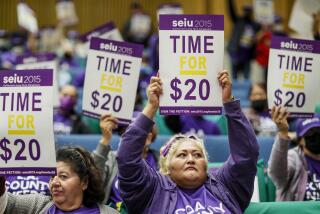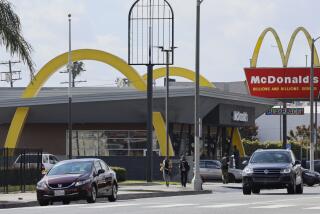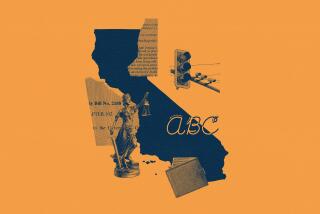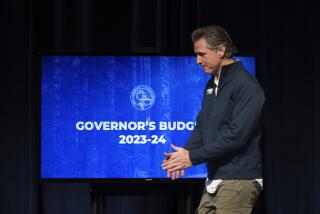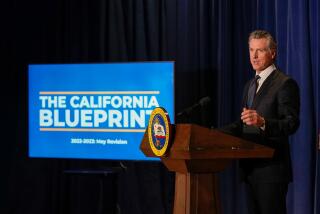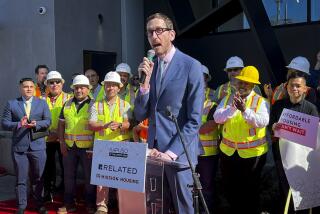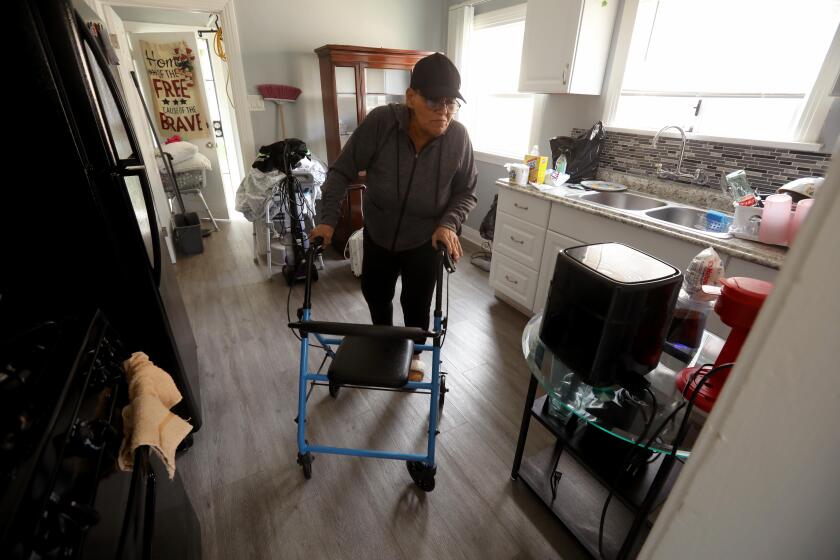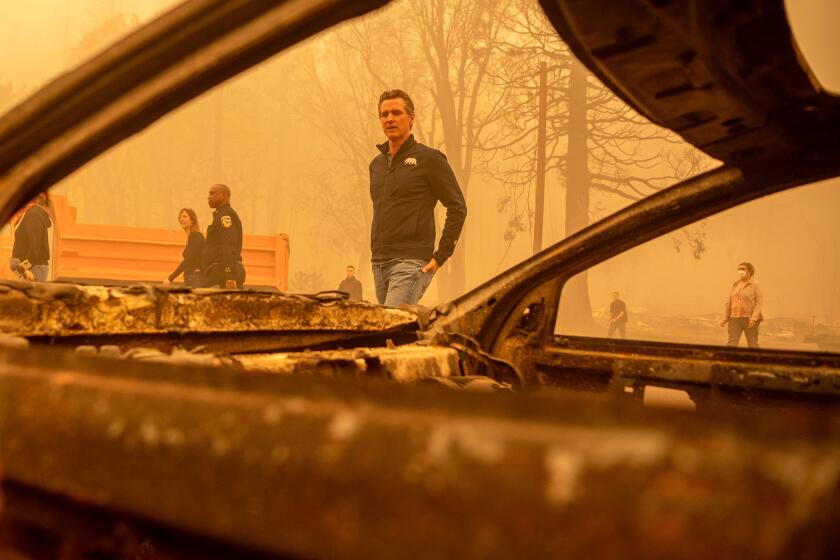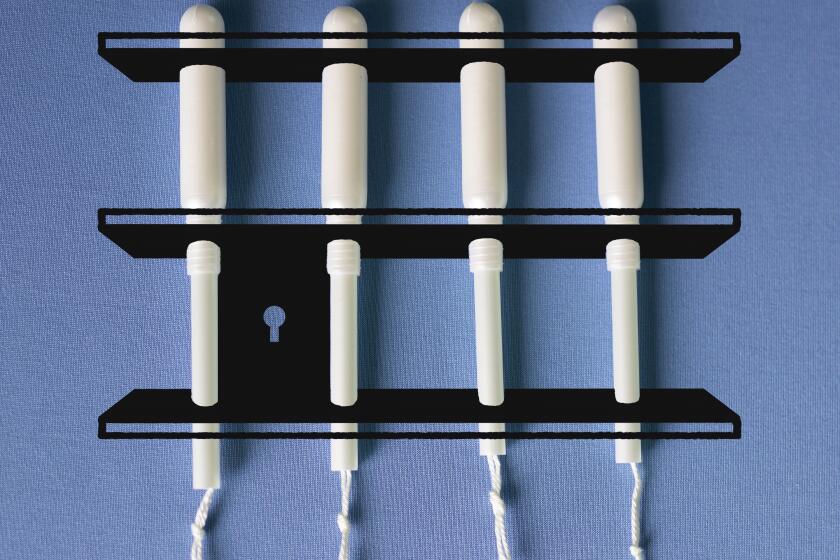Lawmakers Face Deluge of Bills to Beat Deadline
Lawmakers in the Assembly, wading through hundreds of bills, passed legislation Thursday to help curb air pollution and require cargo covers on gravel trucks while voting themselves--and low-income workers--a pay raise.
Late Thursday night, opponents of abortion won a significant victory when the Assembly approved for the first time legislation that would require minors to obtain a parent’s consent before having an abortion.
As legislators rushed to meet today’s deadline for passing bills from their house of origin, the Senate approved its own version of a bill to raise the minimum wage and adopted a measure increasing motor vehicle registration fees by $2 over the next two years to pay for the hiring of 800 new California Highway Patrol officers.
Even facing the crush of bills, the Assembly took the time to vote itself a pay raise. By a vote of 57 to 17, the Assembly passed and sent to the Senate a bill by Assemblyman Tom Bane (D-Tarzana) that would raise legislators’ salaries by 10%, to $40,816.
Bane said the bill would boost salaries by a “measly $300 per month” and then told his colleagues: “I’m really sorry I can’t do more than that. If I’ve got the guts enough to carry this bill, you’ve got guts enough to vote for it.”
Legislators are prohibited from raising their salaries by more than 10% over a two-year period. Their last 10% pay raise was adopted two years ago.
Several hours later, both houses of the Legislature moved to raise the minimum wage from $3.35 an hour to $4.25 an hour.
The Assembly voted 42 to 35 in favor of a bill by Assemblyman Richard Floyd (D-Hawthorne) to raise the minimum wage beginning Jan. 1.
Floyd, noting that the minimum wage was last increased in 1981, charged that it has failed to keep up with the steadily increasing cost of living.
One opponent, Assemblyman Eric Seastrand (R-Salinas), jokingly called Floyd a “cheapskate” and said, “If $4.25 is good, $8.50 would be twice as good, and $12.75 would be three times as good.”
The Senate, meanwhile, voted 21 to 10 to adopt its minimum wage bill by Sen. Art Torres (D-Los Angeles). His bill would set a wage of $4.25 in 1988 and increase it to $5.01 by 1990. However, Torres said he would amend his bill to match the Assembly’s $4.25 level.
Attempting to address the problem of smog, the Assembly passed and sent to the Senate a bill that would impose new deadlines for compliance with clean air standards and a measure that would require car manufacturers to install larger carbon canisters on new vehicles as soon as 1991 to capture unburned fuel vapors.
By a vote of 42 to 32, the Assembly approved the California Clean Air Act by Assemblyman Byron Sher (D-Palo Alto), which would force the South Coast Air Quality Management District, as well as other air pollution control boards, to crack down on both stationary and mobile sources of smog.
Under federal law, California must meet specific air quality standards by the end of this year--a deadline that the state is certain not to meet, particularly in Southern California.
Could Impose Sanctions
After that date, the federal government could impose sanctions on the state, including withholding federal highway funds and placing a building moratorium on stationary sources of pollution such as factories, oil refineries and power plants.
Sher said his bill was intended to prevent such sanctions by establishing the state’s own deadlines for cleaning up the air.
The bill would also make operating permits harder to obtain for facilities considered stationary sources of pollution, such as a plant that would produce energy by burning old tires. And for the first time, it would allow the public, along with industry, to appeal a permit decision.
In addition, the bill would increase civil and criminal penalties for air pollution violations.
The second anti-smog measure, sponsored by Assembly Speaker Willie Brown (D-San Francisco), was approved by a vote of 45 to 23.
Manufacturers Oppose Bill
Automobile manufacturers opposed the bill, saying the carbon canister is unproven, too costly and potentially unsafe. But Brown argued that the devices would cost as little as $14 apiece and would result in cleaner air.
Brown’s bill would also require gas stations throughout the state to install the gas-pump vapor-recovery nozzles now used only in areas that have high levels of air pollution.
The Senate, meanwhile, passed and sent to the Assembly a bill that would increase motor vehicle fees by a total of $40 million to finance the hiring of about 800 additional California Highway Patrol officers.
The bill, approved 37 to 0 without debate, would increase motor vehicle registration fees by $1 effective July 1, 1988, and an additional $1 a year later.
The bill is sponsored by Sen. William Campbell (R-Hacienda Heights), who said the California Highway Patrol’s force of officers has fallen far behind the increase in cars and traffic on the state’s highways.
Used to Hire Officers
Revenue from the first increase would be used to hire officers to enforce laws relating to vehicle theft and vandalism, alcohol and drug offenses and vehicle safety. The second increase would finance a general increase in the number of uniformed officers.
By a vote of 45 to 24, the Assembly passed a bill designed to cut down on the number of broken auto windshields caused by rocks falling from gravel trucks. The measure by Assemblyman Richard Katz (D-Sepulveda) would require trucks to cover the cargoes, completely enclose the sides of trucks, seal off the truck beds and install mud flaps over the tires.
The measure was sent to the Senate, where a similar bill died last year in the face of heavy lobbying against it by the trucking industry.
“This is a real clear bill,” Katz told his colleagues. “It’s real clear that it is the public interest versus a private interest. I ask the membership to take a stand with the public interest on this bill.”
$17 Million a Year
Replacing windshields broken by flying rocks costs California motorists and insurance companies $17 million a year, supporters of the measure estimated.
Under Katz’s bill, a violation of the requirements to cover rock and gravel cargo would be a misdemeanor. Eighteen other states have enacted similar laws.
The Assembly’s 47-23 vote in favor of the parental consent bill followed repeated attempts by opponents of abortion to win approval of such a measure.
The Senate has passed similar legislation in the past but the Assembly has rejected such a proposal at least three times.
The measure would require pregnant minors either to obtain a parent’s consent for an abortion or persuade a judge that they are mature enough to make the decision themselves.
“Parents should be involved in the decisions of their children,” argued Assemblyman Phillip D. Wyman (R-Tehachapi), who has repeatedly sought to bring the measure before the lower house.
No Say in Abortion
Many parents do not understand, he said, why they have to sign a note to allow their daughter to go on a school field trip but have no say in whether she has an abortion.
Opponents of the measure, however, argued that it would force some girls to leave home or seek illegal abortions so they would not have to face their parents.
“This is not going to force your children to talk to you,” said Assemblywoman Maxine Waters (D-Los Angeles). “They will find a way to get abortions. Many of them will get infected and very ill and some of them will die.”
The Assembly defeated on a 41-34 vote an amendment that would have made the parents of a pregnant teen-ager financially responsible for their grandchild until the parents reach the age of 18.
At one point during the marathon Assembly session, Speaker Pro Tem Mike Roos (D-Los Angeles), who was chairing the meeting, got into a lighthearted contest of wits with Bob Barker, host of the TV show “The Price Is Right.”
Animal Rights Activist
Barker was on hand to support a bill that would strengthen the protection of animals from mistreatment by their owners. After the measure was approved by a vote of 52 to 17, the prominent animal-rights activist was honored on the Assembly floor.
When Barker agreed to save time by not making a speech, Roos said if he tried to address the Assembly he would be “barking up the wrong tree.”
“I’ll do the jokes, please,” Barker replied.
“Only on your show. This one’s mine,” Roos said.
“That, of course, means you get no refrigerator,” Barker said.
“Obviously, you haven’t been around here long,” Roos said.
“These hallowed halls are not the place for me to say, ‘The Price Is Right,’ ” Barker responded. “I want to remind you I started out doing ‘Truth or Consequences,’ so watch yourself.”
Increase Benefits
The Senate, acting on two related bills, voted to increase benefits for unemployed and disabled workers. The measures, backed by organized labor and opposed by employer groups, are similar to those approved by the Legislature last year and vetoed by Gov. George Deukmejian.
One bill by Sen. Herschel Rosenthal (D-Los Angeles), approved 21 to 14, would increase the maximum unemployment benefit from the current $166 per week to $186--at a cost to the state of $93 million a year. The measure would also increase the amount of money that a worker must earn in the 12 months prior to injury to be eligible for minimum payments.
The second bill by Sen. Bill Lockyer (D-Hayward), passed on a 22-14 vote, would increase maximum weekly disability checks after work-related injury or illness from $224 to $273. Maximum death benefits would increase from $95,000 to $115,000 under the worker compensation program.
Times staff writer Daniel M. Weintraub also contributed to this story.
More to Read
More to Read
More to Read
Get the L.A. Times Politics newsletter
Deeply reported insights into legislation, politics and policy from Sacramento, Washington and beyond. In your inbox three times per week.
You may occasionally receive promotional content from the Los Angeles Times.
